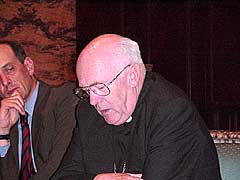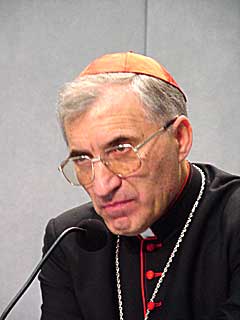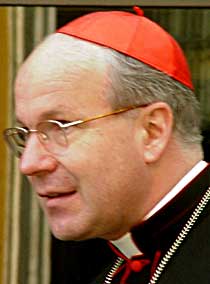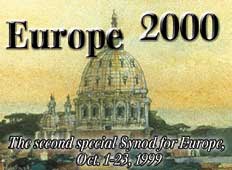European Synod
II
Five Europeans who could be
pope
By JOHN L. ALLEN JR.
Over the three weeks of the European synod, one question keeps
coming up: Are we looking at the next pope?
It hangs in the air every time a cardinal makes some kind of splash.
Many observers here seem convinced that if the next conclave does not
opt for an Italian, they will almost certainly go for a European -
someone with the right languages and, even more importantly, someone
with the cultural savvy to handle the Roman Curia.
There is also the raw political fact that the Europeans, East and
West, amount to 46 of the 106 cardinals eligible to vote in the
conclave if it were held today (at the age of 80, cardinals lose their
voting privileges). They thus represent a powerful voting block.
If this analysis is on the money, it means that John Paul III (or
John XXIV) is probably among the forty-plus cardinals now gathered in
Rome. The trick, of course, is deciding which one.
Among the European cardinals outside Italy, five names seem to
surface repeatedly as papabile.

Cardinal Godfried Daneels, archbishop of Mechelen-Brussels
photos by -- Tom Fox
Godfried Daneels of Belgium, 66, would be a favorite of the
moderates should Cardinal Carlo Maria Martini of Milan falter. A
former professor of liturgy at the Catholic University of Louvain,
Daneels has a reputation for intelligence and pastoral flexibility. A
French journalist who tracks Daneels closely said recently that he is
a very cautious figure, but that may appeal to cardinals who feel this
papacy has moved too far, too fast, on too many issues.
One question mark about Daneels is his health - in late 1997, he had
a very serious heart attack. Others say that Daneels lacks warmth,
that he comes alive on a platform but is incapable of the one-on-one
backslapping and bonhomie any successful politician must practice.
Many observers, however, feel that Daneels has turned heads at the
synod. His intervention, arguing that apparent signs of decline in
European Catholicism carry seeds of hope, was a welcome relief from
what had been a very bleak tone in the opening days.
During the first week of the synod, Daneels gave a talk at the
French national church urging a more compassionate approach to the
problem of civil divorce and remarriage. He said access to the
sacraments for remarried divorcees is an open question - suggesting
that we may need to learn from the Eastern churches, where the
sacraments are seen not as a reward for good behavior but as medicine
for the soul.
The report from Daneels’ small group was also viewed as the
most penetrating of the bunch. On liturgy, it asked the provocative
question of whether the loss of a sense of the sacred is not a problem
of texts or rites (as supporters of a return to the Latin Mass, for
example, argue), but of the modern situation. “Could it be,”
the report asked, “that contemporary man might be a
homoaliturgicus?”
If one were looking for a papabile whose stock is up here,
Daneels would be a good pick.

Cardinal Antonio Maria Rouco Varela, archbishop of Madrid
Spaniard Antonio Rouco Varela, 63, is another name in play,
in large part because John Paul chose him for the most prominent
position in the synod. As relator, it fell to Rouco Varela to
set the opening tone with a major address outlining the issues, then
to deliver another speech at the end of the first round of
interventions summarizing what he’s heard.
Some observers feel Rouco Varela fumbled the opening opportunity,
describing Europe in such dark and accusatory language as to make the
synod seem more like a wake than a celebration of Jesus Christ as the
source of hope (he referred, among other things, to a “present
situation of hopelessness”). He recovered on the second speech,
getting high marks for his synthesis - though it escaped no one’s
attention that Rouco Varela could find no room among his 17 summary
points for the call for greater collegiality issued by Cardinal Carlo
Maria Martini of Milan.
Rouco Varela earned favor with the pope by organizing a highly
successful world youth gathering at Santiago de Compostella when he
was archbishop. Rouco Varela has a doctorate in theology and canon
law; his dissertation was on church-state relations in 16th
century Spain. Most of his teaching career was in canon law, and he
has published in the field.
That, many observers say, is the chief argument against Rouco Varela
as a candidate: After John Paul II, few electors will want another
rigidly legalistic regime. The next pope will probably have to give
the church some room to breathe.
Jean-Marie Lustiger, 73, the cardinal of Paris, has appeared
on the lists of papabili for some time. In part, it’s
because he is an intellectual who has had pastoral success, generating
mild growth in vocations - no mean accomplishment in world-weary
France. In part, the buzz around Lustiger has to do with the fact that
his family background is Jewish, and his election could have
tremendous impact (for good or ill) on the Jewish-Christian dialogue.
The chief drawback to Lustiger is that he is seen as one of John
Paul’s closest disciples within the College of Cardinals. Like
Wojtyla, Lustiger emphasizes the spiritual and ascetic dimensions of
the priestly office; also like Wojtyla, he is a stickler for
orthodoxy. In one of his early acts as archbishop of Paris, he pulled
his seminarians out of the Institut Catholique in Paris, calling its
theology “too speculative.”
On the theory that the next conclave will be looking for someone who
can adjust what they see as the shortcomings of this papacy, Lustiger
would probably not be a front-runner given his close identification
with the policies of John Paul II. Moreover, at 73 Lustiger is nearing
the upper limit of electability. Many observers believe the cardinals
would not elect a pope who is already over the mandatory retirement
age for bishops of 75 set by Paul VI.
During the synod, Lustiger’s intervention confirmed his
reputation for interest in the life of the mind. He spoke on the
relationship between theologians and bishops, beginning with the
question: “Why do we no longer have fruitful Christian thinking?”
He urged bishops to foster good theology through means such as
academic centers and public discussions; he also called on theologians
not to sever themselves from communities of worship and faith. He said
a tight connection between bishops and theologians is essential to
evangelizing a secular world.

Cardinal Christoph Schönborn, archbishop of Vienna
Christoph Schönborn, 54, of Vienna, enjoyed a brief
period after his appointment as cardinal in 1998 when he appeared on
virtually every list of papabili. A Dominican, he served as
general editor of the Catechism of the Catholic Church, a
volume whose surprisingly strong sales impressed everyone. He also won
high marks in his first few months as a peacemaker in Austria, where
the church had been torn apart by a public sexual misconduct scandal
involving his predecessor.
Schönborn comes from an aristocratic background - some 19
members of his family have over the centuries been archbishops,
bishops or priests. He is cosmopolitan, speaking several languages
well (including English), and has traveled widely.
In the last several months, however, many feel Schönborn has
taken himself out of the running through a series of administrative
missteps. He was involved in a public clash with another Austrian
bishop, the deeply conservative Kurt Krenn of Sankt Pölten, and
many people declared Krenn the winner. His blunt talk seemed
preferable to Schönborn’s shifting and evasive comments.
Then Schönborn carried out a purge of his top staff, in one case
informing his vicar general that he was fired by leaving a note on his
doorstep. Polls that once showed Schönborn enjoying the support
of almost 80 percent of Austrians today show similar numbers hoping he’s
called to Rome for a curial assignment.
These stumbles, combined with Schönborn’s relative youth
by papal standards, will present serious obstacles to his election.
But time heals many wounds, and if the election does not occur for
several more years, he is one to watch.
Schönborn won high marks at the synod for demanding an
examination of conscience on the part of the Western European church
about its witness in defense of the East. Noting that the church
behind the Iron Curtain was once called the “church of silence,”
Schönborn asked if we too did not contribute to this silence
through indifference. His comments were taken as a powerful gesture of
fraternity with the Eastern church, and a sign that Schönborn
grasps his role in Vienna, long regarded as the European bridge
between West and East.
Miloslav Vlk, 67, of Prague, is considered a long-shot among
the papabili because he’s from Eastern Europe, and after
Wojtyla the odds of a conclave turning immediately to another pope
from that part of the world are long.
Nevertheless, Vlk enjoys the support of colleagues across Europe, as
demonstrated by his election to head the Council of European Bishops
Conferences -- making him the successor to Martini. His life story
also commands respect. Under the communists in Czechoslovakia, Vlk was
denied permission to function as a priest and spent several years on
the streets as a window-washer, spending his nights in the underground
church - risking arrest with virtually every Mass he said or
confession he heard.
Vlk is a bright man. His 1999 book Also avanti! reveals a
thinker deeply in touch with both the Western and the Eastern halves
of the continent, and that could be profoundly appealing to electors.
He also speaks several languages.
In the eyes of many observers, however, Vlk has hurt himself at the
synod. His intervention was entirely devoted to the new movements,
especially Focolare, which Vlk first encountered when he was in the
seminary in East Germany in 1964. During his days as a window washer
he belonged to Focolare community, which he described in his book as a
kind of “paradise.”
His emphasis on the movements, because they are such a favorite of
John Paul II, did little to suggest how a Vlk papacy might lead the
church in new directions. Moreover, electors will not be satisfied
with a single-issue candidate; they will want someone with a broader
vision. Finally, because some bishops have reservations about the
movements, Vlk’s enthusiasm for them may raise doubts about his
judgment on other issues.
National Catholic Reporter, October 15, 1999
|



